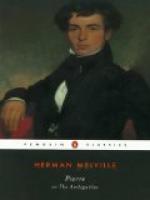|
This section contains 13,922 words (approx. 47 pages at 300 words per page) |

|
SOURCE: “Hearing Narrative Voices in Melville's Pierre,” in boundary 2, Vol. 17, No. 1, Spring, 1990, pp. 100-32.
In the following essay, Wald characterizes Pierre as an endless succession of narrative voices and perspectives that requires the readers' participation in making conclusions about the events of the novel.
Melville's Pierre inaugurates the tradition of author protagonists in American literature.1 Pierre Glendinning's declaration of independence from an authorizing cultural discourse immediately precedes his resolve to write a novel that will “gospelize the world anew.” But his narrative consciousness underwrites his apparently resistless damnation, as Pierre submits precisely to those self-evident truths that he has ostensibly rejected. Pierre, we learn, is actually writing two books, and the unconsciously authored narrative that dooms him deconstructs the narrative about Vivia, himself an “author-hero,” to expose Pierre's “plagiari[sm] of his own experiences.” The result, Pierre, is a compilation of unravelings that frustrates narrative expectations as it...
|
This section contains 13,922 words (approx. 47 pages at 300 words per page) |

|


